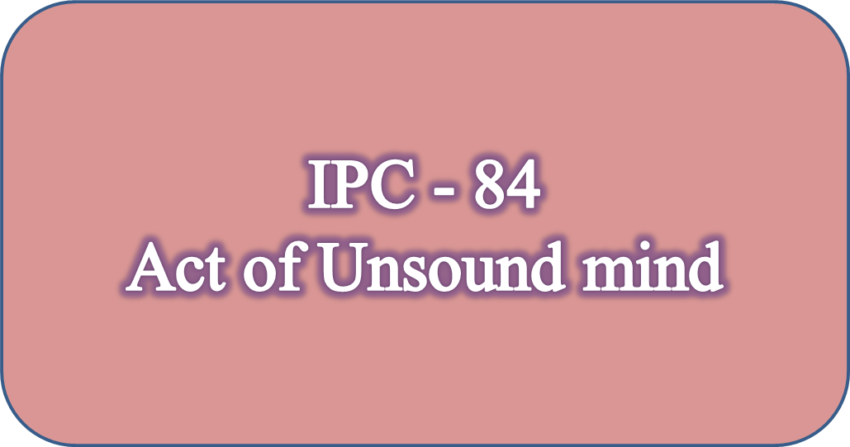Act of Unsound Mind
Section 84. Act of a person of unsound mind
Whenever any act is done by a person who is incapable of knowing the nature of the act that he is doing either wrong or contrary to law due to unsoundness of mind then the act shall not be an offence.
The act is exempted under the code from criminal liability where the accused is not charged of the crime committed. As the act shows absence of mens rea i.e. guilty mind. While Actus reus and mens rea are two essential elements to impose criminal liability on accused.
According to Principle of criminal liability in IPC which is basis on latin maxim “Actus non faciet reum nisi mens sit rea”
Essential elements of section 84-
- Accused was of unsound mind when committed the offence; and
- He was not capable of knowing the nature of the act; or
- The act was contrary to law; or
- The act was wrong
Kinds of Insanity-
Legal insanity – A person is legally insane when he is incapable of knowing the nature of the act or that what he was doing was wrong or contrary to law.All legal insanity are medical insanity.
Medical insanity –A person who is suffering from mental disease or his brain is not quite all right is a medical insane. It includes all type of insanity.All medical insanity are not legal insanity.
McNaughten Rule –
In the landmark case R V Daniel McNaughten(1)1843 RR 59,
Sudhakaran v. State of Kerala, (2010) 10 SCC 582
The house of Lords formulated the famous Mc Naughton rules on the basis of the 5 question, which had been referred to them with regard to the defence of insanity. The reference came to be made in a case where McNaughton was charged with the murder by shooting of Edward Drummond, who was the Private Secretary of the prime minister of England Sir Robert Peel. The accused McNaughtn produced medical evidence to prove that he was not at the time of committing the act, in a sound of mind. He alleged that he was suffering from an insane delusion that the Prime Minister was the only reason for all his problems. He had also alleged that as a result of the insane delusion, He mistook Drummond for the Prime Minister and committed his murder by shooting him. The plea of insanity was accepted and McNaughten was found not guilty on the ground of insanity.
The aforesaid verdict became the subject of debate in the house of Lords. therefore it was determined to take the opinion of all the judges on the law governing such cases. A set of five questions were formulated as a result of it make the law more lucid on the topic and the answer to It has become the core principles of the law of insanity as an absolving factor.
The answers given by the judges in McNaughten case may be summarised in the following five rules :
- That every man is presumed to be sane and to possess a sufficient degree of region to be responsible for his crimes until the contrary be proved to the satisfaction of the court
- In order to establish defence on ground of insanity it must be clearly shown that at the time of committing the act, the accused was labouring under such a defect of reason from disease of the mind to the extent where could not know the nature of his acts or the act was contrary to law; or the act was wrong.
- If the accused was capable to know the nature of his act or the act was contrary to law; or the act was wrong then he would be punishable.
- If criminal act is done by a person under some insane delusion as to the surrounding facts, which conceals him from the true nature of the act he is doing, he will be under the same degree of responsibility as he would have been on the facts as imagined in the them to be
- A medical witness who has not seen the accused before trial should not be asked on the evidence whether he thinks that the accused was insane.
Kinds of Unsound Mind
Bapu v. State of Rajasthan, (2007) 8 SCC 66
It is held that There are four kinds of persons who may be non compos mentis (not of sound mind)
1. An idiot- An idiot is one who is of non-sane memory from his birth, by a perpetual infirmity, without lucid intervals and those are said to be Idiots who cannot count 20, or tell the days of the week, or who do not know their fathers or mothers, or the like.Idiocy as natural insanity.
2. One made non compos by illness- A person made non compose by illness is excused in criminal cases from such acts as are committed while under the influence of his disorder.
3. A lunatic or a madman- a lunatic is one who is affected by mental disorder only at certain periods and vicissitudes, having intervals of reason. madness is permanent. lunacy and madness are spoken of as acquired insanity.
4. And one who is drunk.
Chapter 25 of CrPC, 1973 deals with provisions as to accused persons of Unsound mind.
Case Law:
In Sheralli Wali Mohammed v. State of Maharashtra 1972 crlj 1523
It should be proved that at the time of the commission of the acts, the appellant was incapable of knowing the nature of the act or the acts were either wrong or contrary to law due to reason of unsoundness of mind. The question may be asked , Is there evidence to show that he was labouring under any such incapacity at the time of the commission of the offence? On this question, the state of his mind before and after the commission of the offence is relevant.
Brushabha Digal v. State of Orissa, 1993 CrLJ 3149(Ori.)
The accused caught hold of the legs of a girl of two years of age on the road and struck her on the ground. She sustained head injury and died in the hospital. On the basis of the ocular evidence about the conduct of the accused at the time of the offence and the opinion of the doctor about his state of mind, the accused was acquitted on the ground of insanity.
State of Maharashtra V Umesh Krishna power 1994 crlj 774 Bom.
Where the accused, a young man, took a girl of 4 years on a bicycle to a lonely place near canal, sexually assaulted her and threw her into the canal, it was held that it was a carefully thought out action and not an act of an insane person.
State of Rajasthan v. Shera Ram, AIR 2012 SC 1
In general epilepsy occurs from early infancy, although it may occur at any period of life. Individuals, Who have had epileptic fits for years, do not necessarily show any mental aberration but quite a few of them suffer from mental deterioration. Such patients are peevish, impulsive and the suspicious, and are easily provoked to anger on the slightest cause. Epileptic psychosis is that which is associated with epileptic fits. It can happen before or after the fits or may replace them and It is known as pre – epileptic, post – epileptic and masked or psychic phases(Psychomotor epilepsy).
Jagdish V state Of MP 2009 9 SCC 495
In a case of Ganja addict before the supreme court, the accused had killed his wife and children ranging one- 16 years with knife. Death sentence was confirmed by the high court. The accused had not raised the defence of unsoundness in courts below. The supreme court got the enquiry conducted by police after a plea was raised at the SLP stage. There is enquiry report and evidence of family members and other witnesses revealed the addiction and ongoing treatment. He was not allowed the benefit of section 84. The state of mind on the day of the of the incident is the crucial factor. The state of mind on the day of the incident is the crucial factor. The State of mind on other days is relevant only if such evidence would help determining the state of mind at the crucial moment.
Dahyabhai Chhaganbhai Thakkar v. State of Gujrat, AIR 1964 SC 1563
The Supreme Court defined the doctrine of burden of proof in the context of the plea of insanity in the following propositions:
(1.) The prosecution must prove beyond reasonable doubt that the appellant had committed the offence with the requisite mens rea; and the burden of proving that always rests on the prosecution ( State) from the starting to the ending of the trial.
(2.) There is a rebuttable presumption that the appellant was not insane, when he committed the crime, in the sense laid down by section 84 of the IPC, 1860 the appellant may rebut it by placing before the court all the relevant evidence – oral, documentory or circumstantial, but the burden of proof upon him is no higher than that rests upon a party to civil proceedings. (3.) Even if the appellant was not able to establish conclusively that he was insane at the time he committed the offence, the evidence placed before the court, a reasonable doubt may be raised in the mind of the court by the appellant or prosecution as regards one or more of the ingredients of the offence, including mens rea of the appellant and in that case the court would be entitled to acquit the appellant on the ground that the general burden of proof resting on the prosecution was not discharged.
Shibu v. State of Kerala, 2013 (4) KLJ 300
The Division Bench of High Court of Kerala observed that even if all the acts constituting an offence as per definition in IPC, 1860 are committed by a person, if an IPO finds during investigation that accused was incapable of knowing the nature of the act, or that he was doing what is either wrong or contrary to law due to unsoundness of mind, as stated in Section 84 IPC, 1860, he shall not file a chargesheet against such person.

